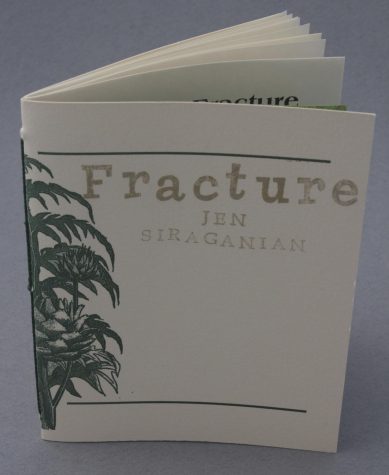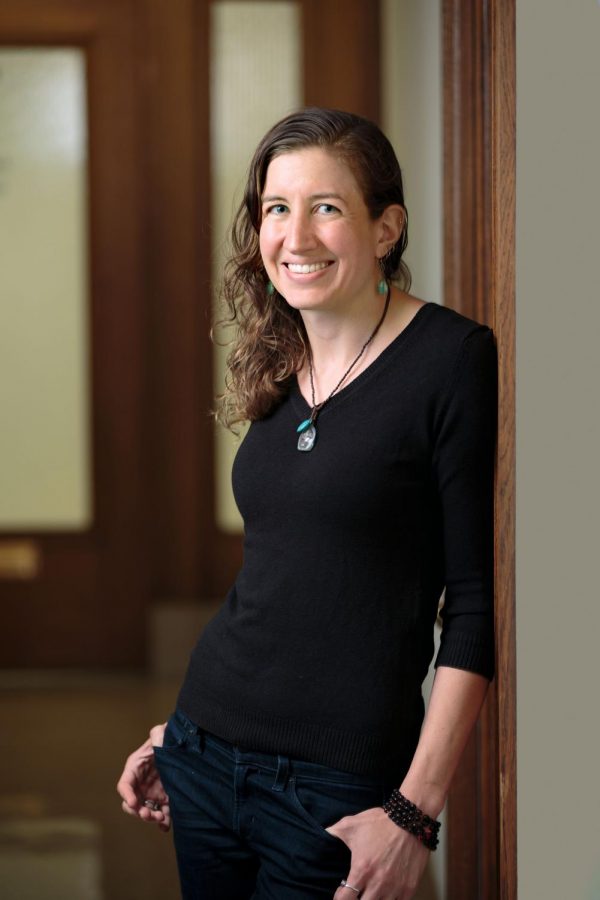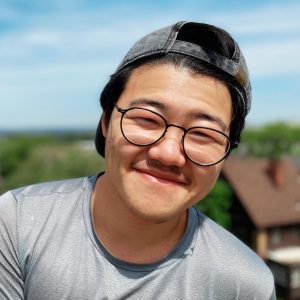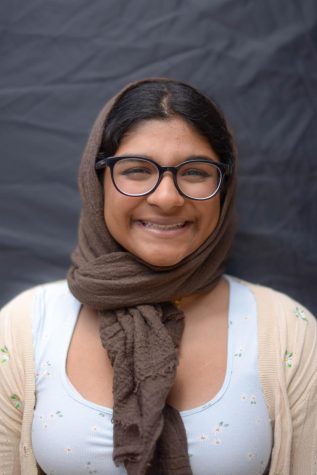The Poet’s Project: “There’s this musicality in us that comes out”
Upper school English teacher Jen Siraganian immerses herself in words
Provided by Jen Siraganian
“Be the person you are and write the poems and the stories that are in you and that you’re surrounded by because that’s what’s going to make fantastic poetry,” Siraganian said.
May 8, 2021
Upper School English Teacher Jen Siraganian is the Los Gatos Poet Laureate and the author of “Fracture” a poetry chapbook published by Deconstructed Artichoke Press.
She has discovered strength and tenderness in sharing and creating stories, and she believes that poetry has the unique ability to bring out those stories in us. She has found grounding in poetry as a means of documenting her experiences and passing down the tales of her people that are rooted in the ideas of survival and selfhood.
Siraganian writes freely and frequently, participating in challenges such as NaPoWriMo, an experience that consists of writing a poem every day for National Poetry Month in April. Although writing can seem like a solitary experience, Siraganian believes deeply in community as a way to gain inspiration and develop a greater love for poetry.
In an effort to create space in which writers can interact and learn from one another, she has managed Litquake: San Francisco’s Literary Festival. In addition to writing on her own and with others, Siraganian enjoys sharing the world of words with students, helping them understand that everyone has a voice, everyone can create art, and everyone can build something with their stories.
Her writing has been nominated for the Pushcart Prize and can be found in print and online literary journals including “Best New Poets 2016,” “Cream City Review,” “Mid-American Review,” “Smartish Pace,” “Barrow Street,” “Southwest Review” and “Not Somewhere Else But Here: A Contemporary Anthology of Women and Place.”
Siraganian spoke with Winged Post assistant features editor Sarah Mohammed (10) about her experiences writing her own poetry, teaching English and Creative Writing at Harker and being involved in the poetry world of Silicon Valley as the current Los Gatos Poet Laureate. The interview has been edited and condensed for clarity.
I didn’t start writing poetry, I wrote stories. I grew up surrounded by stories. Three of my grandparents are survivors of the Armenian Genocide, and they were orphans, so I knew their stories very well. When there are attempts to exterminate an entire race, and this was happening with Armenians, there’s this need for those who made it out, those who survived to speak and share their stories. Their stories have to be told to the world. We have to learn from these stories as well.
I heard all these stories, tragic and horrendous survivor tales, but they moved me in a really deep way. As a child, I would take a loose piece of paper, I would rip it up into three or four pieces, and I would write a story on each one. I found such joy in creating narratives.
It really wasn’t until middle school, early high school that I started writing poetry, and I just fell in love with the form. I just kept writing, and I did an honors thesis in creative writing, which is like a book-length manuscript, at the end of my senior year [in college and then went on to get my MFA in creative writing.
I think poetry is so freeing. What I always like to tell my students is that they can do whatever they want. The thing in poetry is, you can break all the rules, and you should break the rules because that’s what makes poetry sing — when you do the unexpected, and you really surprise not only your readers but yourself.
I was inducted on April 6 [for the Los Gatos Poet Laureate Position], and I’ve already been meeting with the executive director of the library. I’m really excited to start collaborating with local schools. My first plan is to do a reading of California poets who have released books in the last year.
I know so many poets and writer friends who have released their books that they have wanted to bring out in the world for years, and now they’re finally out in the world and they weren’t able to go on book tours because of [COVID-19]. I really want to make sure that I can give them some kind of exposure, help people know their books are out, to go buy them.
I want to put a real focus on BIPOC writers. I think that there’s such an essential need for poets to see that there’s such a wide range of poets out there. Especially what we’re seeing this year with the number of hate crimes right here in the Bay Area, which is supposed to be such a progressive and tolerant and open-minded community, [shows] a tremendous sense of limited perspective and animosity towards people of color or people of different religions.
As a poet, I can help bring the works of more poets, specifically poets of color out there, because that is a necessity. I want people to know that, “no, we shouldn’t just be reading white male writers.” I can’t underestimate the amount of talent there is for writers that we’re not all reading but that we need to be. That to me feels very important, to bring those poets into more people’s bookshelves.

This is a very tech-saturated area right now in Silicon Valley, so the need for the arts is more crucial here than ever. It’s not like we’re bringing poetry to Manhattan or San Francisco, places that already have really vibrant, vibrant literary scenes. There is a need here, and I’m hoping in my tenure that I’ll be able to do that.
I’ve been involved in Litquake ever since I moved to the Bay Area in 2008. I first started volunteering for them and slowly started organizing more of their events. They’re the largest literary festival on the West Coast, bringing in close to 1,000 writers and poets every year. So it’s this explosion of literary talent and creative energy that I think is so vital.
You can’t write in a vacuum: writing needs community, writing needs exposure, and that is what Litquake does. What I hope to accomplish with a poet laureate position is to make those connections and show that we feed off each other’s creative energy.
There are a number of times when I would organize an event and walk out of the venue inspired to write forty more poems, and it’s amazing. You can’t do that unless you continually thrust yourself into spaces where you are constantly learning. I think that that will just help all of us become bigger, better people.
I’m teaching Tennyson and Browning, these are poets that I absolutely adore. It is very thrilling to teach some of my favorite works to students and to try to infect them with that same love that I have. My poetry is constantly informed by what I teach, and I’m very inspired. When I read a line of prose or a poem that a student writes, that creates the kind of vibrations in the soul that we all look for as poets.
There’s a thrill because there’s poetry in each of us: for some of us it is right on the surface, and some of us like to have to dig deeper to get to it. But it’s there. There’s this musicality in us that comes out. I’m surrounded by words, by reading and writing, so that makes it really fun to immerse myself in the craft.
My advice for teenagers is to write all the time. Any chance you get: write by hand, write on your phone, write down images, text a line you think of to your friend. Make [poetry] part of your life. When you’re taking a walk and you see something that just strikes you deeply, jot it down. You’re opening your eyes as a poet. Be the person you are and write the poems and the stories that are in you and that you’re surrounded by because that’s what’s going to make fantastic poetry.


















![“[Building nerf blasters] became this outlet of creativity for me that hasn't been matched by anything else. The process [of] making a build complete to your desire is such a painstakingly difficult process, but I've had to learn from [the skills needed from] soldering to proper painting. There's so many different options for everything, if you think about it, it exists. The best part is [that] if it doesn't exist, you can build it yourself," Ishaan Parate said.](https://harkeraquila.com/wp-content/uploads/2022/08/DSC_8149-900x604.jpg)




![“When I came into high school, I was ready to be a follower. But DECA was a game changer for me. It helped me overcome my fear of public speaking, and it's played such a major role in who I've become today. To be able to successfully lead a chapter of 150 students, an officer team and be one of the upperclassmen I once really admired is something I'm [really] proud of,” Anvitha Tummala ('21) said.](https://harkeraquila.com/wp-content/uploads/2021/07/Screen-Shot-2021-07-25-at-9.50.05-AM-900x594.png)







![“I think getting up in the morning and having a sense of purpose [is exciting]. I think without a certain amount of drive, life is kind of obsolete and mundane, and I think having that every single day is what makes each day unique and kind of makes life exciting,” Neymika Jain (12) said.](https://harkeraquila.com/wp-content/uploads/2017/06/Screen-Shot-2017-06-03-at-4.54.16-PM.png)








![“My slogan is ‘slow feet, don’t eat, and I’m hungry.’ You need to run fast to get where you are–you aren't going to get those championships if you aren't fast,” Angel Cervantes (12) said. “I want to do well in school on my tests and in track and win championships for my team. I live by that, [and] I can do that anywhere: in the classroom or on the field.”](https://harkeraquila.com/wp-content/uploads/2018/06/DSC5146-900x601.jpg)
![“[Volleyball has] taught me how to fall correctly, and another thing it taught is that you don’t have to be the best at something to be good at it. If you just hit the ball in a smart way, then it still scores points and you’re good at it. You could be a background player and still make a much bigger impact on the team than you would think,” Anya Gert (’20) said.](https://harkeraquila.com/wp-content/uploads/2020/06/AnnaGert_JinTuan_HoHPhotoEdited-600x900.jpeg)

![“I'm not nearly there yet, but [my confidence has] definitely been getting better since I was pretty shy and timid coming into Harker my freshman year. I know that there's a lot of people that are really confident in what they do, and I really admire them. Everyone's so driven and that has really pushed me to kind of try to find my own place in high school and be more confident,” Alyssa Huang (’20) said.](https://harkeraquila.com/wp-content/uploads/2020/06/AlyssaHuang_EmilyChen_HoHPhoto-900x749.jpeg)




!["My biggest tip [for young writers], the thing I would have told myself, is just to be as weird as you are in your writing. Let your images be strange. Pretend you're talking to yourself: give yourself that permission to talk. Be as weird as you are," Benaim said.](https://harkeraquila.com/wp-content/uploads/2021/04/162516536_875625363287193_8622420487431577924_n-300x400.jpeg)

!["When I was interviewed [for the Santa Clara Youth Poet Laureate position], I realized I was the youngest person at the table. And I was 32. I was wondering, 'How am I the youngest person here?'" Sapigao said. "And so I thought this whole thing would change if there was a young person at the table. That's part of the reason why I wanted to start the Youth Poet Laureate program."](https://harkeraquila.com/wp-content/uploads/2021/02/JaniceLoboSapigao2-300x225.jpg)



